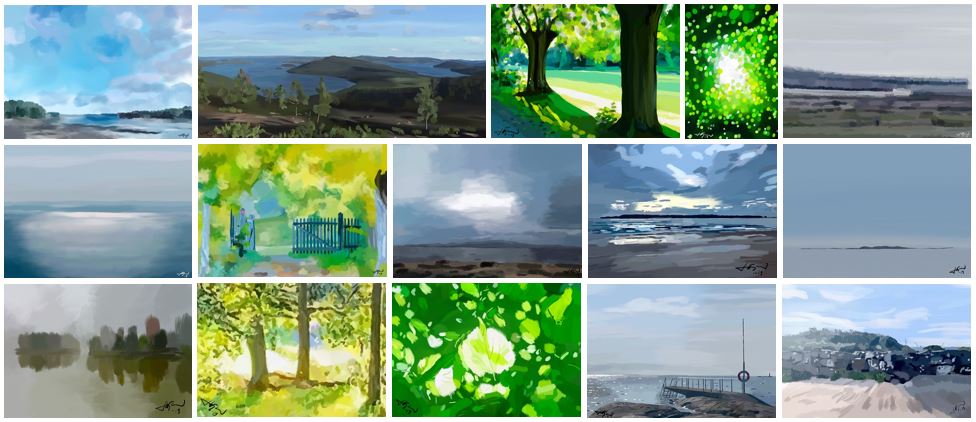This is a summary of my reading and painting during the last month (week 40–44, 2019).
Paintings
I published the following paintings at Jan Höglund Art:

Reading
I finished reading the following books:
- The Book On The Taboo Against Knowing Who You Are by Alan Watts. Watts explores in this book who, or what, we really are. We are in an urgent need—even more so today than when Watts wrote this—of a sense of our own existence which is in accord with physical facts and which overcomes our feeling of alienation with nature.
- A Question of Physics: Conversations in Physics and Biology conducted by Paul Buckley and F. David Peat. The book contains conversations with Werner Heisenberg, Paul Dirac, Roger Penrose, Ilya Prigogine, Robert Rosen, David Bohm, and others. Buckley and Peat have focused on areas, they feel, hint at the next scientific revolution. It’s a very interesting book.
- The Seven-Day Weekend: Changing the Way Work Works by Ricardo Semler. This book reminds me of Ricardo Semler’s other book Maverick: The Success Story Behind the World’s Most Unusual Workplace. Ricardo Semler is a visionary and most unusual himself.
- Pedagogy of the Oppressed by Paulo Freire. This is, in many, ways an amazing book. What Paulo Freire has to say about oppression and human freedom is highly relevant. But Freire’s revolutionary language is awkward, and I don’t see any value in his references to Marx, Lenin, Mao, and Castro. If anything, these men were oppressors. Paulo Freire has much wisdom to share all by himself. I liked the book.
I started reading and re-reading the following books:
- Notes on the Synthesis of Form by Christopher Alexander.
- Changing Conversations in Organizations: A Complexity Approach to Change by Patricia Shaw.
I want to read the following books and added them to my reading list:
- Systemic Consulting: The Organisation as a Living System by Siebke Kaat and Anton de Kroon.
- Just Mercy: A Story of Justice and Redemption by Bryan Stevenson.
Notes
Finally, I made the following notes to myself:
- Organizing arises through the movement of inquiry rather than as an output of it.
- Inquiry is making fresh sense between us how we get to be here and how we can move beyond.
- Generative organizing is about shifting the focus from planning of outcomes to participation in inquiry.
- Our interactions are always evolving in ways that we cannot control or predict, no matter how sophisticated our planning.
- Dialogue is a special form of conversation.
- Generative organizing is conversational.
- I have to paint to balance my darkness.
- The manager has no choice but to dominate.
- Paulo Freire’s generative theme reminds me of David Bohm’s generative order.
- Loving commitment is dialogical.
- I am increasingly detecting a gap between teams who understand how work works and senior managers who are still driven by management myths.
- What we value, or not, has consequences.
- It’s very hard to reach a well-adapted state in any organization we are trying to meddle in.
- Life-affirming organizing can only be obtained when we agree to use the worker’s feeling of his or her own aliveness. Subjective as it sounds to our mechanistic ears, this is nonetheless objective. It opens the door to a Christopher Alexander’s concepts of wholeness, centers, fifteen properties, and structure-preserving transformations shed useful light on organizing.
- One cannot confront the problems of organizing without facing fundamental questions of human feeling, spirit, and beauty.
- Wholeness is related to aliveness.
- Wholeness can be felt but is hard to define.
- Wholeness is where the whole remains whole.
- Instantaneous connection is a form of wholeness.
- It is all too easy for our thinking to lose sight of the very quality of livingness.
- You can’t grasp the past, the present, or the future.
- We can’t pin down what’s implicate.
- By calling something something, we dispose ourselves to think of it in that way.
- We need to reconnect with our five-year-olds within.
- It “takes two” to make something happen.
- The order the generative work mirrors acting; it is organic, unfolding, and embraces ambiguity.
- Love flows through, stronger than any destructive force. –Skye Hirst
- The whole both determines its sub-wholes and organizes its activity. –David Bohm
- There are profound connections between the way organisms work and the quantum level.
- Our belief systems deeply influence the organizations we create.
- Movement, transformation and change are primary (verbs), not interaction between objects (nouns).
- Live in the present.
- Together yet apart (nonlocality).
- What if there is no disorder, but only different degrees of order?
- What the next moment will bring is unknown, let alone the next day, month, year.
- It’s easy to desire the wrong things.
- It’s easy to be certain and wrong.
- There’s so much in life that cannot be calculated.
- As one is, so one sees.
- Lovingness is your being. You don’t have to be separate. –Skye Hirst
- Implicate order is subtle and pervasive.
- People are already self-organizing.
- Implicate order is more powerful than explicate
- You cannot change a system unless you transform consciousness.
- Organizations are more like organisms than machines.
- Coherence is the basis of living organization.
- Living organization allows organisms to be organisms.
Leave a Reply
You must be logged in to post a comment.